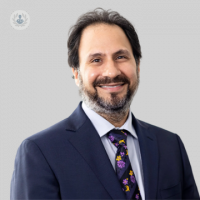The test you want to fail: what is cardiovascular risk assessment?
Escrito por:A cardiovascular disease (CVD) risk assessment is a series of questions about age, weight, family history, medical history, and lifestyle habits such as diet and physical activities. With that combined information in consideration, it can calculate the likelihood of developing cardiovascular disease, and provide guidelines on what needs to be monitored or changed in order to reduce the risks. It is a vital tool for the prevention of CVD. Professor Ronak Rajani, an expert in cardiology, goes over the CVD assessment process.

CVD risk assessment is recommended for people aged 40 or older, as it is normally at that age when people begin to experience heart issues. However, those who are younger but have with a family history of CVD are also applicable for assessment.
What sort of questions are asked for CVD risk assessments?
Different clinics and institutions will have developed their own risk assessment calculators, so there’s variation in what information they require, but the results are always given in a percentage. The questions they ask may differ, but across all of them there will questions regarding:
- age
- gender
- weight
- height
- blood pressure levels
- cholesterol levels
- smoking habits, current or prior
- alcoholic drinking habits
- diabetes status
- activity level – exercise, routines, and hobbies, for example
- diet
- use of medications
What do the results mean?
Different clinics and institutions will have developed their own risk assessment calculators, so there’s variation in what information they require, but the results are always given in a percentage. When the percentage result is lower, that means the chance of CVD is lower, and if it is higher, then vice versa. A low risk would be considered less than 5%, whereas a high risk is considered more than 20% chance. Some calculators will be able to predict the lifetime risk of CVD, whereas most will only predict up to 10 years.
The results will be derived from previous clinical studies with the data of other patients who had similar profiles to the responses that were being tested or treated for CVD. It is not a guarantee or a promise, but a prediction. There are factors that cannot be changed, like family history and age, but there are lifestyle changes that can be adjusted in order to mitigate risk.
Patients are encouraged to improve their diet and minimise eating saturated fats and other harmful foods. Adopting a more active lifestyle helps, as well as quitting or at least reducing the frequency of cigarettes. The doctor may also recommend medications to manage high blood pressure and cholesterol, such as statins and blood thinners.
Further questions about the results can be discussed with the doctor.
If you would like to take a cardiovascular risk assessment, Professor Ronak Rajani is available for consultation via his Top Doctors profile.


